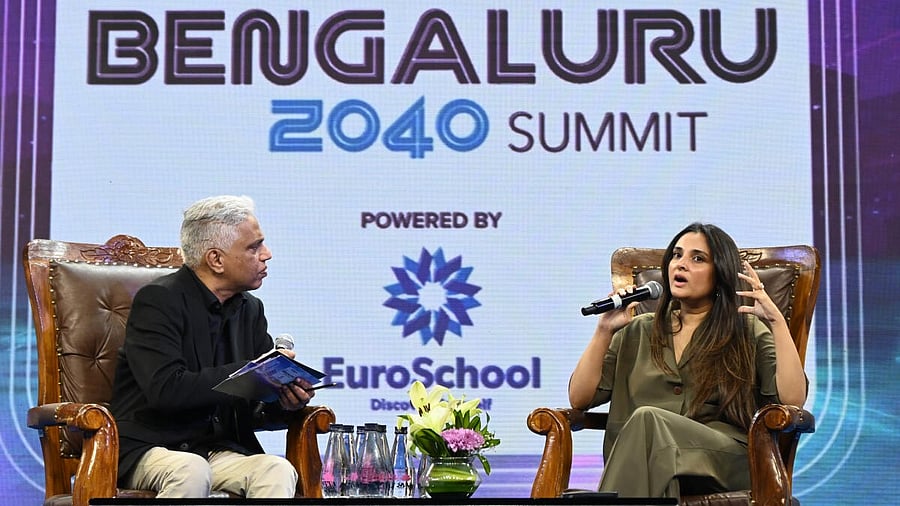
Actor Ramya during the DH Bengaluru 2040 summit.
Credit: DH Photo/B K Janardhan
Bengaluru: In a fire side chat at the DH Bengaluru 2040 summit, actor-politician Ramya shared her insights on 'Supercharging Arts & Entertainment in Bengaluru' with DH's Associate Editor S R Ramakrishna on Friday evening.
The conversation with the actor addressed topics connected to films and the arts scenario of Bengaluru.
When asked about what Bengaluru's identity in terms of arts, entertainment and culture were, compared to cities like Chennai and Hyderabad, she said: "Bengaluru's identity is that it has no identity, meaning that it is constantly evolving, transforming, growing and innovating. The minute I give it an identity, I would be limiting it's art and culture scene."
She added that Bengaluru "was not what we used to know earlier", and described the city "as a melting pot, where anyone was free to experiment and allow art to flourishOn being asked what Bengaluru could be named as a capital to, comparing to cities in the country and globally, she said "everything". Be it films, music or sports, the city has it all, she added.
Kannada film industry and scripts
Having turned a film producer, she was asked how she looked at cinema produced from Bengaluru, to which OTT hasn't been too receptive. About the future of cinema, she said, that the industry's box office hits from last year could be counted on one's fingers. "Most of them revolved around the heroes, which could be just offering one kind of narrative, of machoism," she added.
On why the Kannada film industry was still working with scripts that were dated, Ramya mentioned that "it was high time we learnt from our mistakes, and understand what's working and what is not".
Pointing to the Malayalam film industry, she said that the last decade saw the industry evolve, and how "their films were about stories and not machoism".
She also added that despite approaching OTT platforms for film releases in the past, not many were purchasing Kannada films. "How do smaller filmmakers make money then?" she asked.
Commenting on the state's subsidy policy for the film industry and what government could do to boost Kannada cinema, she said that subsidies are a good way of recovery for a filmmaker.
On what more could be done, she said that the Karnataka Chalanachitra Academy could hold workshops for script writing and fund films to encourage talent and filmmakers, she added.
When asking about what other industries could learn from the Kannada industries, Ramya says that some filmmakers in the Kannada film industry have churned out new styles of filmmaking, which have influenced others. "After KGF, one could see many films which used the sepia tones in their scenes," she added.
Women in films
On being asked if women could take the charge for changes in the industry by 2040 and what they could do, Ramya said that including women's perspectives would help, "as it would make us look empathetic and passionate as a society".
"I love Aachar&Co by Sindhu (Sreenivasa Murthy). I also loved
Gangumoote. I still don't think anyone has been able to show women's feelings as Roopa (Rao) did in the film," she recalled.
About future projects, she shared that she is looking for an exciting project. "I would like to be back on the screen. As for production, I will always prioritise women's narratives," she said.